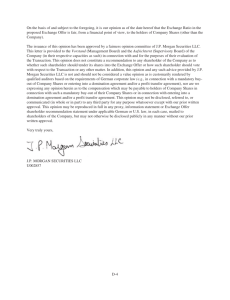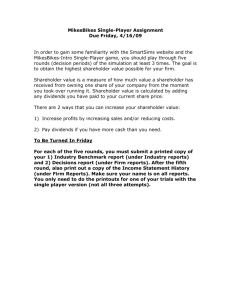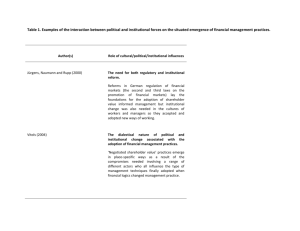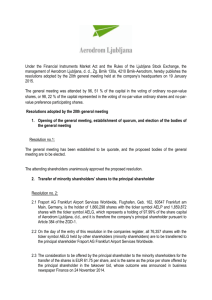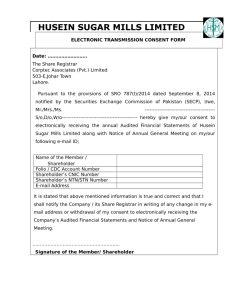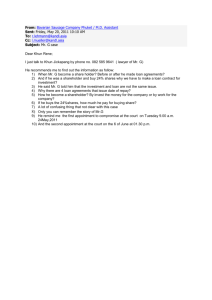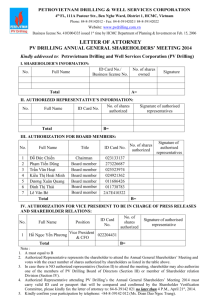Rights Issue
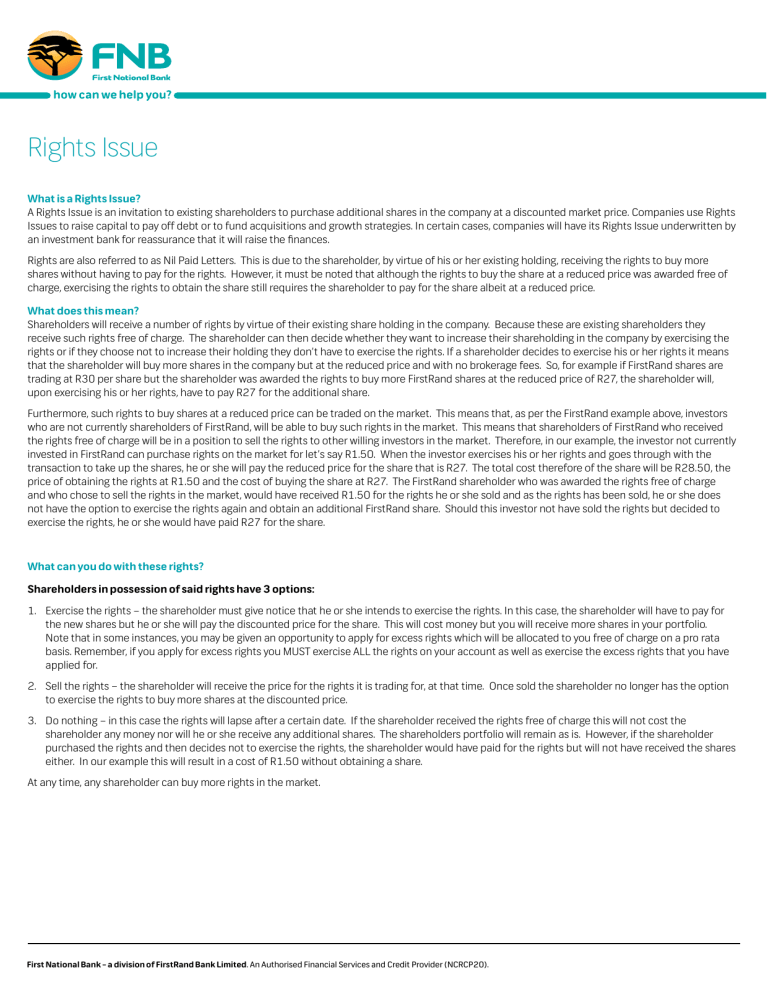
Rights Issue
What is a Rights Issue?
A Rights Issue is an invitation to existing shareholders to purchase additional shares in the company at a discounted market price. Companies use Rights
Issues to raise capital to pay off debt or to fund acquisitions and growth strategies. In certain cases, companies will have its Rights Issue underwritten by an investment bank for reassurance that it will raise the finances.
Rights are also referred to as Nil Paid Letters. This is due to the shareholder, by virtue of his or her existing holding, receiving the rights to buy more shares without having to pay for the rights. However, it must be noted that although the rights to buy the share at a reduced price was awarded free of charge, exercising the rights to obtain the share still requires the shareholder to pay for the share albeit at a reduced price.
What does this mean?
Shareholders will receive a number of rights by virtue of their existing share holding in the company. Because these are existing shareholders they receive such rights free of charge. The shareholder can then decide whether they want to increase their shareholding in the company by exercising the rights or if they choose not to increase their holding they don’t have to exercise the rights. If a shareholder decides to exercise his or her rights it means that the shareholder will buy more shares in the company but at the reduced price and with no brokerage fees. So, for example if FirstRand shares are trading at R30 per share but the shareholder was awarded the rights to buy more FirstRand shares at the reduced price of R27, the shareholder will, upon exercising his or her rights, have to pay R27 for the additional share.
Furthermore, such rights to buy shares at a reduced price can be traded on the market. This means that, as per the FirstRand example above, investors who are not currently shareholders of FirstRand, will be able to buy such rights in the market. This means that shareholders of FirstRand who received the rights free of charge will be in a position to sell the rights to other willing investors in the market. Therefore, in our example, the investor not currently invested in FirstRand can purchase rights on the market for let’s say R1.50. When the investor exercises his or her rights and goes through with the transaction to take up the shares, he or she will pay the reduced price for the share that is R27. The total cost therefore of the share will be R28.50, the price of obtaining the rights at R1.50 and the cost of buying the share at R27. The FirstRand shareholder who was awarded the rights free of charge and who chose to sell the rights in the market, would have received R1.50 for the rights he or she sold and as the rights has been sold, he or she does not have the option to exercise the rights again and obtain an additional FirstRand share. Should this investor not have sold the rights but decided to exercise the rights, he or she would have paid R27 for the share.
What can you do with these rights?
Shareholders in possession of said rights have 3 options:
1. Exercise the rights – the shareholder must give notice that he or she intends to exercise the rights. In this case, the shareholder will have to pay for the new shares but he or she will pay the discounted price for the share. This will cost money but you will receive more shares in your portfolio.
Note that in some instances, you may be given an opportunity to apply for excess rights which will be allocated to you free of charge on a pro rata basis. Remember, if you apply for excess rights you MUST exercise ALL the rights on your account as well as exercise the excess rights that you have applied for.
2. Sell the rights – the shareholder will receive the price for the rights it is trading for, at that time. Once sold the shareholder no longer has the option to exercise the rights to buy more shares at the discounted price.
3. Do nothing – in this case the rights will lapse after a certain date. If the shareholder received the rights free of charge this will not cost the shareholder any money nor will he or she receive any additional shares. The shareholders portfolio will remain as is. However, if the shareholder purchased the rights and then decides not to exercise the rights, the shareholder would have paid for the rights but will not have received the shares either. In our example this will result in a cost of R1.50 without obtaining a share.
At any time, any shareholder can buy more rights in the market.
First National Bank - a division of FirstRand Bank Limited. An Authorised Financial Services and Credit Provider (NCRCP20).
What is important to keep in mind?
The following is not an exhaustive list but highlights the main elements to keep in mind:
1. If you receive rights to buy a particular share by virtue of an existing holding on the company, you will receive the rights free of charge however, exercising the rights will cost you money. You received the rights for free but have to pay for the new shares.
2. If you decide to exercise the rights, you have to notify FNB Share Investing of your intention by the given date.
3. If no instruction was received by FNB Share Investing, the rights will lapse after a given date.
4. If you decide to buy rights on the market, you will pay for the rights AND you will have to pay for the shares if you exercise the right.
5. Even if you bought more rights on the market, you still have to notify FNB Share Investing of your intention to exercise the rights.
6. If you notify FNB Share Investing of your intention to exercise the rights, you have to have sufficient funds in your Share Investing account to pay for the shares. Should you not have sufficient funds in your account, the trade will not go through.
7. If you apply for excess rights, you must ensure that you have sufficient funds in your account to exercise ALL the rights in your account together with the excess rights that you are requesting for.
8. Rights are valid only for a short period of time after which it has to be exercised or it will lapse.
9. Caution: You can lose money trading in rights. If you have bought rights but never notify FNB Share Investing of your intention to exercise the rights, the rights will lapse after the specified date and you will lose the option to buy the shares. Your account would have been debited with the cost of the rights.
How do I know whether I am trading in rights or the real share?
Rights are placed on the market under the same share code but indicated with an N. For example, the FirstRand share code is FSR and the rights will be FSRN. If awarded rights on FirstRand you will see in your portfolio a holding for FirstRand Bank Limited (FSR) and also a holding for FirstRand Bank
Limited NPL (FSRN). It is therefore vital that you check whether you are trading in the actual share or the rights to buy the share.
What information can I expect to receive from FNB Share Investing?
We will inform you of the Rights Offer only if you are a qualifying shareholder and have mandated us to refer offers to you. Kindly refer to your corporate actions options on your Share Investing Account.
How do I sell or buy additional rights?
You may sell all or part of your rights, or purchase additional rights on the market via FNB Online Banking or by calling our call centre on 0860 742 737.
How do I exercise my rights?
To exercise your rights, you MUST provide an instruction to our FNB Share Investing Corporate Actions Department via email to ShareInvestingCA@fnb.
co.za or by calling 0860 742 737, by no later than the deadline date.
What is an excess application?
In certain cases, companies give their shareholders an opportunity to apply for additional rights which is called an excess application. Once the rights offer closes, the surplus rights that were not exercised are allocated to each applicant shareholder on a pro-rata basis. Therefore, excess applications are not guaranteed. If the rights offer is oversubscribed, no excess rights will be allocated to the applicant shareholders. Shareholders may receive a percentage of excess rights depending on how many surplus rights are left in the market. If a shareholder applies for excess rights, he will be obliged to exercise ALL the rights on his account as well as the excess rights that are allocated to him.
Contact us
If you have any further questions regarding Rights Issues, please feel free to email us on shareinvesting@fnb.co.za
or call 0860 SHARES (742 737).
First National Bank - a division of FirstRand Bank Limited. An Authorised Financial Services and Credit Provider (NCRCP20).
